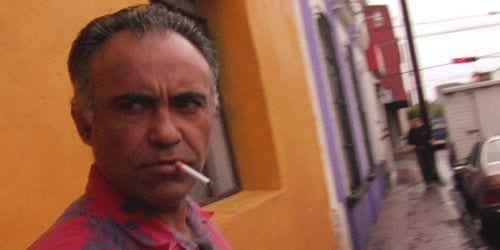
“You should always judge a person by the way they are when you first meet him, not by the past,” advises Augie Garcia. “Because everybody has skeletons in their closet.” His niece Monika Navarro is inclined to agree, and at first, it’s not hard to see him as he presents himself, a warm and lonely man now “moving to something better, with God’s blessing.”
Navarro decides to document her developing relationship with Augie as she heads out to visit him in a jail in Guadalajara. As she recalls in her film, Lost Souls (Animas Perdidas), which premieres 23 March in PBS’ Independent Lens series, she was an art student in Boston in 1999, when she heard he and his brother Gino had been deported. Gino, she notes in her introduction to the film, died soon after and was buried in a common grave in Mexico, for “animas perdidas.” Though she planned to make a film about her uncles’ deportations, she soon found herself “telling a different story… about a kind of exile that has nothing to do with the government.”
In 2000, as Navarro’s camera pans over Augie’s cell, he points out his clothes, toiletries, and a suitcase given him by Gaby, Navarro’s mother. The narrow bed and tiny TV fill the cell, but he smiles, looking forward to his release the next day. As Navarro explains, Augie’s expectations are tempered by his concern that his family is judging — and rejecting — him. A year later, when she visits him again, at work in Guadalajara, she begins with her own judgment: “He was barely getting by,” Navarro says over footage of him hammering and measuring, “doing odd jobs with tools my mother had sent him.” As you see him bent over his work, his head bowed away from the camera, Navarro observes, “He continued to struggle with drug addiction.”
Still, Navarro persists with her project. When she hears that Augie’s father abused him (beating him “so hard that blood would spatter the walls”), she’s moved to ask other family members more questions. As you see their ID photos and footage of the boys playing gleefully in a backyard (the house was “next to a lemon orchard in California”), she reports that Augie and Gino moved to the U.S. when they were boys, attended American schools, and served in the Navy. Their deportation — no matter how they came to their illegal activities — was traumatic, removing them from the family and life they knew. In Mexico, Navarro discovers, they felt lost and abandoned, even as their relatives back in the States — her mother Gaby and Augie’s son Alex — felt similarly.
In turn, Gaby is studying to become an immigration lawyer, hoping to help her brother and others who fell through cracks (the camera holds on an ominous pile of papers, the 300 pages constituting Augie’s case), while also frustrated that her brother continues to ask her for money, apparently unable to achieve a sense of independence or self-confidence. And Alex joins the Marines, resenting his father’s absence but wanting to feel closer to him. (Navarro notes that back when her uncles enlisted, immigrants were not granted citizenship in return for military service.)
Navarro seems inclined to sympathize with her mother, but then an interview with Augie provides a vivid illustration of these ongoing tensions from his view. He sits before the camera and Navarro speaks from off-screen, the dynamic lurching into something like an interrogation, more adversarial than familial. Asked how he feels when he asks Gaby for support, he’s visibly tense: “I’m so fucking nervous,” he starts, then goes on: “She starts lecturing me. I wish at that time her soul could come into my body and feel how nervous I am feeling, how low I feel, how degrading it is for me to ask her for help.” Bodies and souls, borders and regrets, the film is suffused with unusual poetry. When Augie takes a next self-expressive step, accusing his relatives of judging him, and missing Gino, who never did. Navarro stands up and crosses the frame, leaving her uncle to stare into the camera, abandoned again, his face caved in. When she comes back, articulating her own affront at his accusations (“It insults me when you say you have no family”), he asks her to “shut the tape off, please.”
Lost Souls goes on to tell other stories, exposing the tangle of loss and desire that shapes the experiences of all the Garcias, their efforts to keep connections across borders. For this is the film’s fundamental focus, the effects of borders at once national and familial. As the brothers’ identities were shaped and fragmented by their experiences in America, other family members have also been affected by mixing cultures, generational rifts, and changing expectations. Gaby reveals a difficult marriage to Navarro’s long-absent father, Danny; Navarro tracks him down as well, further complicating and expanding this story she didn’t start out to tell.
Throughout, Navarro exposes her part in the storytelling process, raising questions about how the present shapes the past, and vice versa. At one point, she’s reluctant to touch her uncle, who hasn’t bathed in days but still “needs someone to hug him.” She confesses, “I was glad I was holding a camera.” Describing her self-awareness and self-doubts, Navarro helps to make sense of the turmoil she sees and has absorbed. And as the filming becomes part of the family’s process, the film is at once closely observed and revelatory.

![Call for Papers: All Things Reconsidered [MUSIC] May-August 2024](https://www.popmatters.com/wp-content/uploads/2024/04/all-things-reconsidered-call-music-may-2024-720x380.jpg)



